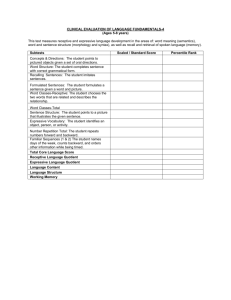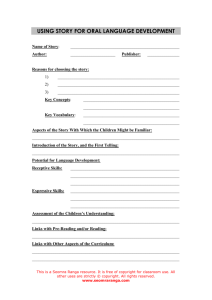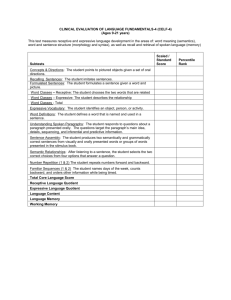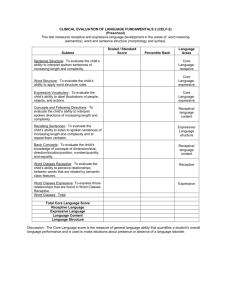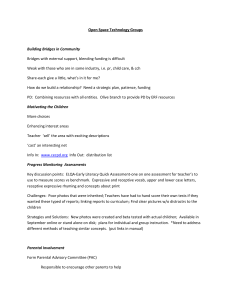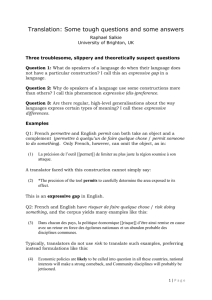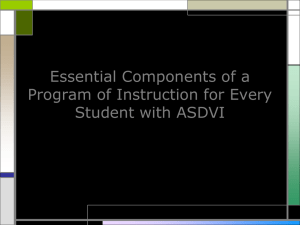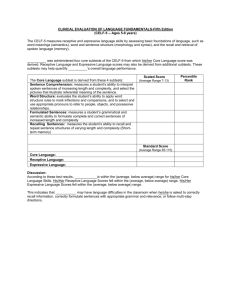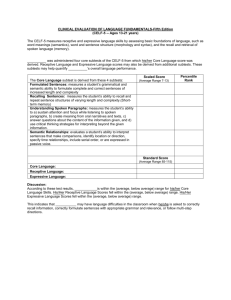Expressive Language - Taunton Public Schools
advertisement
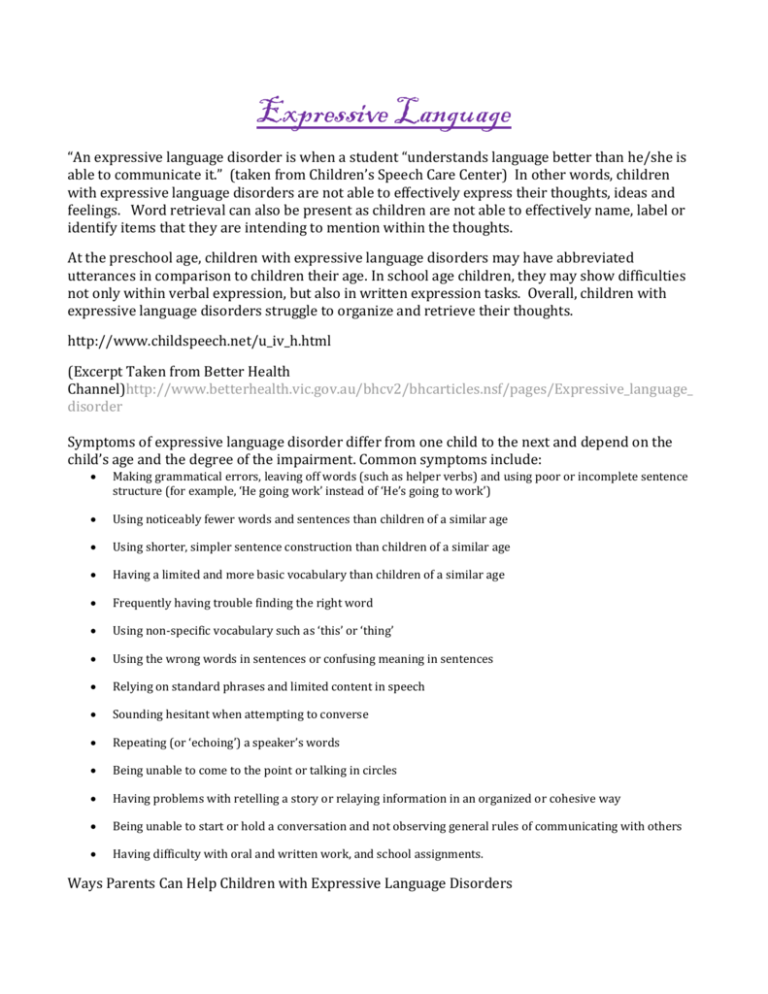
Expressive Language “An expressive language disorder is when a student “understands language better than he/she is able to communicate it.” (taken from Children’s Speech Care Center) In other words, children with expressive language disorders are not able to effectively express their thoughts, ideas and feelings. Word retrieval can also be present as children are not able to effectively name, label or identify items that they are intending to mention within the thoughts. At the preschool age, children with expressive language disorders may have abbreviated utterances in comparison to children their age. In school age children, they may show difficulties not only within verbal expression, but also in written expression tasks. Overall, children with expressive language disorders struggle to organize and retrieve their thoughts. http://www.childspeech.net/u_iv_h.html (Excerpt Taken from Better Health Channel)http://www.betterhealth.vic.gov.au/bhcv2/bhcarticles.nsf/pages/Expressive_language_ disorder Symptoms of expressive language disorder differ from one child to the next and depend on the child’s age and the degree of the impairment. Common symptoms include: Making grammatical errors, leaving off words (such as helper verbs) and using poor or incomplete sentence structure (for example, ‘He going work’ instead of ‘He’s going to work’) Using noticeably fewer words and sentences than children of a similar age Using shorter, simpler sentence construction than children of a similar age Having a limited and more basic vocabulary than children of a similar age Frequently having trouble finding the right word Using non-specific vocabulary such as ‘this’ or ‘thing’ Using the wrong words in sentences or confusing meaning in sentences Relying on standard phrases and limited content in speech Sounding hesitant when attempting to converse Repeating (or ‘echoing’) a speaker’s words Being unable to come to the point or talking in circles Having problems with retelling a story or relaying information in an organized or cohesive way Being unable to start or hold a conversation and not observing general rules of communicating with others Having difficulty with oral and written work, and school assignments. Ways Parents Can Help Children with Expressive Language Disorders Give your child your attention and listen when they are trying to explain to you about their day or an exciting event. Allow them time to process through their thoughts without interrupting or filling in words for them. Although difficult, this process is important for them to understand how to organize their thoughts to communicate. Wait, Wait and Wait. Allow children to have pauses and hesitations in their thoughts. These pauses or breaks allow for them to organize and think about what they want to say next. Repeat information, Repeat messages and Repeat your thoughts. Encourage children to repeat when they make a mistake in their expression. Gently correct their errors and repeat or rephrase their message for them. Repeat your information calmly to them, giving them less information if they are appearing confused. Expand and add to language. When a child has an expressive language disorder, they tend to speak in more abbreviated language. It is important to add to their language in a way to encourage them to hear how to develop and add to their sentence length. For example, if a child wants a “ball” ask them to explain “which ball? The big, blue ball or the small, red ball?” Model clear speech. It’s important to talk slowly and accurately with children who have expressive language disorders. Using slow and deliberate speech is always important for children to hear how to develop and enhance language skills. Reading is always a great developer of language. Reading helps children listen and engage in language in a visual manner. Act out the stories and make them exciting to your child. Enjoy the time of sitting together and developing their language. Expressive Language Exercises: http://www.speech-therapy-on-video.com/expressiveandreceptivelanguageexercises.html 1. Naming Opposites This is a simple exercise you can use to start the day. It's a great "warm-up" activity. Create a list of ten words and then ask for the opposite of each one. Once the list is mastered you can create a new one. Remember to keep it challenging, but not too difficult. If your loved one can only give you an antonym for two out of ten words, you might want to choose new words for your list. Expressive and Receptive Language exercises for Antonyms: Examples to elicit expressive responses: Easy: What is the opposite of up? Moderate: What is the opposite of full? Difficult: What is the opposite of accept? To make this a receptive exercise (which will include prepositions) you will have to present objects and manipulate them to demonstrate different positions. For example, to demonstrate the prepositions; in, on, and beside, you can use a box and two spoons. First, place one spoon on the box and the other spoon beside the box. Ask, "Which spoon is on the box?" Have your loved one attempt to choose the appropriate spoon. Remember to always praise their effort whether the answer is right or wrong. As you change the location of the spoons you will challenge your loved one's understanding of each preposition or antonym provided (in, out, on, off, beside, behind, in front). You can also increase the difficulty of each question by increasing the number of objects used (in this case they were spoons). For example, you can use three spoons - one in the box, beside the box, and on the box. Then ask, "which spoon is beside the box?" With a little creativity you can create a variety of expressive and receptive language exercises using antonyms (opposites). 2. Word Finding Word finding activities are used to assist in word recall. Through a variety of word finding techniques the patient can practice strategies that can help word retrieval. A great way to practice this at home is to say a sentence and leave the last word out. It's best if the missing word is a person, place, or thing. Expressive and Receptive Language exercises for Word Finding: Expressive Word Finding Examples: Easy: Wash your hands with soap and ... Moderate: I sewed my pants with a needle and ... Difficult: The Eiffel Tower is in ... To modify this activity into a receptive vocabulary exercise, provide three or four pictures of objects (cut out pictures from newspapers and magazines) and then ask your loved one to point to one of them. Easy example: "Point to the picture that shows a purse." Difficult example: "Point to the person that's disappointed." Word finding difficulty is a common deficit associated with aphasia. Frequent practice of expressive and receptive exercises will help improve an individual's naming abilities. 3. Synonyms Listing words that have similar meanings is also a good exercise to help increase word knowledge. However, some expressive and receptive language exercises can be very challenging. This is one of them. When creating a list of synonyms be careful not to make them too difficult. It is recommended that your list of synonyms be no more than six words. Remember - there are often more than one or two right answers. Synonym Examples: Easy: Another word that means the same as, warm Moderate: Another word that means the same as, under Difficult: Another word that means the same as, many 4. Categories This is a great activity to practice expressive and receptive language exercises. You can approach this exercise in two ways: a) Give a list of words and have your loved one provide the category they belong to. b) Provide a category and have your loved one list items that belong to it. Expressive and Receptive Language exercises for Categories: Expressive Category Examples: Easy: Apples, oranges, and pears belong to what category? Moderate: Oak, pine, and maple belong to what category? Difficult: Name three things that are containers. To make this a receptive exercise, provide pictures of different foods and ask; "which one is a fruit?" Or, show pictures of several containers and ask; "which one holds garbage?"
